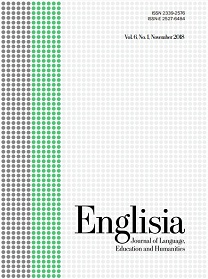Auditory and kinaesthetic learning styles and L2 achievement: A correlational study
DOI:
https://doi.org/10.22373/ej.v8i2.7529Keywords:
Auditory learning style, kinaesthetic learning style, L2 achievement, correlationAbstract
This study investigated undergraduate non-English major university students’ auditory and kinaesthetic learning styles and their relationships to second language (L2) achievement in English. It was conducted to resolve the conflicting findings in the literature on the directions and strength of the relationships between learners’ learning styles and their achievements and to investigate the field in relatively under-researched Indonesian participants. The study used a survey as the method of data collection and found out that learners used auditory slightly more dominantly from kinaesthetic, yet both learning styles were merely used at low to moderate levels. The study further found very weak and statistically not significant associations between these learning styles and L2 achievements, suggesting that contrary to various learning theories highlighting the importance of learners’ learning styles in L2 learning, these learning styles may not be an important determinant of L2 achievement. Based on the findings, possible future studies are suggested concerning the implications, contributions, and limitations of the study.
Downloads
References
Aboe, R. M. (2018). Correlation between students learning styles and their learning achievement. Seminar Nasional Pendidikan, December.
Afshar, H. S., & Bayat, M. (2018). Strategy use, learning styles and L2 achievement of Iranian students of English for Academic Purposes. Issues in Educational Research, 28(4), 1039–1059.
Ajideh, P., Zohrabi, M., & Pouralvar, K. (2018). Investigating the relationship between learning styles and ESP reading strategies in academic setting. International Journal of Applied Linguistics and English Literature, 7(3), 156–164. https://doi.org/10.7575/aiac.ijalel.v.7n.3p.156
Aliakbari, M., & Qasemi, N. (2012). On the relationship between Iranian EFL learners’ learning style preference and their gender, proficiency level and achievement score. International Journal of Pedagogies and Learning, 7(3), 275–283. https://doi.org/10.5172/ijpl.2012.7.3.275
Bailey, P., Onwuegbuzie, A. J., & Daley, C. E. (2000). Using learning style to predict foreign language achievement at the college level. System, 28, 115–133.
Barsch, J. (1991). Barsch learning style inventory. Open Library.
Bishka, A. (2010). Learning styles fray: Brilliant or batty? Performance Improvement, 49(10), 9–13. https://doi.org/10.1002/pfi
Brahmakasikara, L. (2013). Learning styles and academic achievement of English III students at Assumption University of Thailand. ABAC Journal, 33(3), 41–52.
Castro, O., & Peck, V. (2005). Learning styles and foreign language learning difficulties. Foreign Language Annals, 38(3), 401–409. https://doi.org/10.1111/j.1944-9720.2005.tb02226.x
Cohen, L., Manion, L., & Morrison, K. (2007). Research methods in education (6th ed.). Routledge.
Dornyei, Z. (2005). The psychology of the language learner: Individual differences in second language acquisition. Lawrence Erlbaum.
Gilakjani, A. P. (2012). Visual, auditory, kinaesthetic learning styles and their impacts on English Language Teaching. Journal of Studies in Education, 2(1), 104–113. https://doi.org/10.5296/jse.v2i1.1007
Gilakjani, A. P., & Ahmadi, S. M. (2011). The effect of visual, auditory, and kinaesthetic learning styles on language teaching. International Conference on Social Science and Humanity, 5, 469–472. https://doi.org/https://doi.org/10.1111/j.1461-0248.2011.01660.x
Gray, D. E. (2014). Doing research in the real world (3rd Editio). Sage Publications, Ltd.
Huang, F., Hoi, C. K. W., & Teo, T. (2018). The influence of learning style on English learning achievement among undergraduates in Mainland China. Journal of Psycholinguistic Research, 47(5), 1069–1084. https://doi.org/10.1007/s10936-018-9578-3
Israel, M., & Hay, I. (2006). Research ethics for social scientists. SAGE Publications Ltd.
Liu, J., & He, Q. (2014). The match of teaching and learning styles in SLA. Creative Education, 05(10), 728–733. https://doi.org/10.4236/ce.2014.510085
Masela, M., & Subekti, A. S. (in review). Indonesian university students’ visual learning style: Learners’ and teachers’ perspectives. ETERNAL (English, Teaching, Learning, and Research Journal).
Moenikia, M., & Babelan, A. Z. (2010). The role of learning styles in second language learning among distance education students. Procedia - Social and Behavioral Sciences, 2, 1169–1173. https://doi.org/10.1016/j.sbspro.2010.03.167
Naning, Z. A., & Hayati, R. (2011). The correlation between learning style and listening achievement of English Education Study Program Students of Sriwijaya University. Jurnal Holistics, 3(5), 1–11.
Oluremi, F. D. (2015). Learning styles among colleges students. International Journal for Cross-Disciplinary Subjects in Education, 5(4), 2631–2640.
Pritchard, A. (2009). Ways of learning: Learning theories and learning styles. Routledge.
Setyoningsih, D. L. (2019). The correlation of visual, auditory, and kinesthetic learning style on students’ English learning achievement. Language-Edu: Journal of English Teaching and Learning, 8(2), 1–6.
Tabatabaei, O., & Mashayekhi, S. (2013). The relationship between EFL learners’ learning styles and their L2 achievement. Procedia - Social and Behavioral Sciences, 70, 245–253. https://doi.org/10.1016/j.sbspro.2013.01.061
Vaishnav, R. S. (2013). Learning style and academic achievement of secondary school students. Voice of Research, 1(4), 1–4.
Yildirim, O., Acar, A. C., & Bull, S. (2014). Relationship between teachers’ perceived leadership style, students; learning style, and academic achievement: A study on High School students. Educational Psychology, 28(1), 72–81. https://doi.org/10.1080/01443410701417945
Yulia, Y. (2013). Teaching challenges in Indonesia: Motivating students’ and teachers’ classroom language. Indonesian Journal of Applied Linguistics, 3(1), 1–16.
Downloads
Additional Files
Published
Issue
Section
License
Proposed Policy for Journals That Offer Open Access
Authors who publish with Englisia journal agree to the following terms:
- Authors retain copyright and grant the journal right of first publication with the work simultaneously licensed under a Creative Commons Attribution License that allows others to share the work with an acknowledgement of the work's authorship and initial publication in this journal.
- Authors are able to enter into separate, additional contractual arrangements for the non-exclusive distribution of the journal's published version of the work (e.g., post it to an institutional repository or publish it in a book), with an acknowledgement of its initial publication in this journal.
- Authors are permitted and encouraged to post their work online (e.g., in institutional repositories or on their website) prior to and during the submission process, as it can lead to productive exchanges, as well as earlier and greater citation of published work (See The Effect of Open Access).









